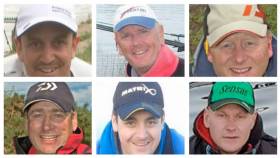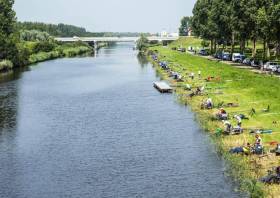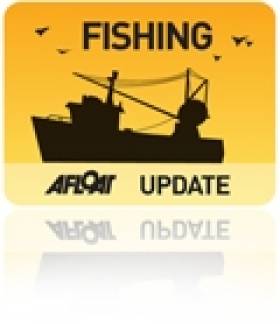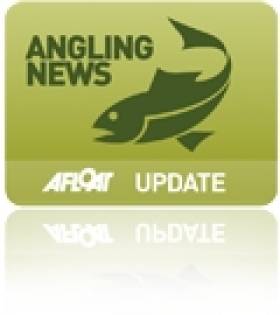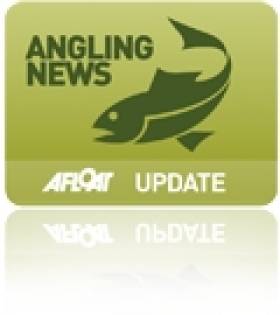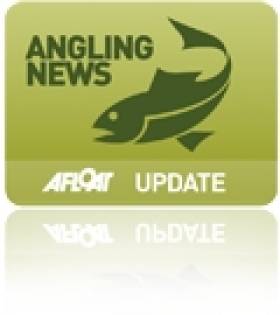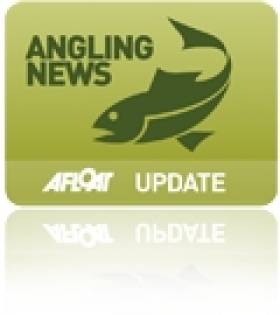Displaying items by tag: coarse fishing
Irish Angling Team Announced For 2017 Feeder Worlds
#Angling - The National Coarse Fishing Federation of Ireland (NCFFI) has announced its line-up for the 2017 FIPS-ed Feeder World Championships.
Michael Buchwalder, Nick Howell, Cathal Hughes, Johnny McKinnley, Rimantas Kondrackas and Paul Leese comprise the team to represent Ireland in Portugal this June.
“I am very pleased to be able to present a refreshed world championship team this year, and welcome the three new members to the squad,” said team manager Brenton Sweeney. “In the last three years, Ireland has achieved a team silver medal and four section wins and we are currently ranked 12th in the world.
"It has always been my ambition to introduce younger members to the squad and it’s great to start my second term by welcoming the enthusiastic Johnny and Rimantas along with Nick, who brings extensive knowledge of international championships.
“Former team member Philip Jackson and Paul Heaney of Lurgan CAC will provide support to the team in Portugal and I’m delighted to appoint Philip my assistant manager as we coach these anglers at home and away.
“I would like to take this opportunity to thank the NCFFI and our sponsors for their invaluable support as we look to the year ahead.”
Teams are also being assembled for the European Championships in Italy this May and the Worlds in Belgium in September, as well as the Home Internationals in Scotland the following month.
The NCFFI is a voluntary body, a member of the Angling Council of Ireland and the national governing body for coarse and predator angling recognised by Sport Ireland and SportNI.
Irish Anglers Needed For Coarse Fishing Teams Headed Abroad
#Angling - Tuesday 31 January is the deadline for anglers across the island of Ireland to express their interest in joining one of two teams prepping for international competitions this year.
As the Belfast Telegraph reports, the National Coarse Fishing Federation of Ireland (NCFFI) will be sending teams to the European Championships in Italy on 20-21 May and the Worlds in Belgium on 9-10 September, as well as the Home Internationals in Scotland this October.
Interested anglers should complete the application form available HERE or by January 31 or contact Senior Float Team manager Vincent Walsh at [email protected] or +353 87 256 3669.
Judge Convicts Men for Illegal Fishing Activities
#illegalfishing – Four men have been convicted of illegal fishing activities at two different sittings of Galway District Court on Tuesday, 1st July 2014. Judge Mary Fahy imposed fines and costs totally €4,900 to three brothers, Vidmantas Gaidys, Sigitas Gaidys and Alvydas Gaidys, convicted of illegal fishing activities; and John Costello was convicted of taking oysters illegally and fined €250, with costs of €300.
Illegal Fishing
Vidmantas Gaidys, of 21 Beal Srutha, Ballybane, Galway was convicted of using a net illegally, obstruction of fishery officers, and possession of a salmon in breach of fisheries legislation. Sigitas Gaidys, of 9C Bayview Rise, Ballybane, and Alvydas Gaidys, of Farm House, Cloonbiggen Road, Claregalway, were both convicted of the illegal use of a net, and obstruction of fishery officers.
Judge Fahy heard evidence that on the night of 19th October, 2013, the three men were in a van which fishery officers stopped close to the Clare River at Montiagh North, Claregalway, Co Galway. Vidmantas Gaidys was apprehended, while the other two men fled on foot. When the van was searched, two bags containing 78 coarse fish and 1 salmon were discovered. The other two men were later identified and interviewed. All three admitted to using a net, and pleaded guilty in court.
Judge Fahy warned that using the vehicle in the course of the offence was a serious matter, and she told Mr. Gaidys that if he came before her for a similar offence she would disqualify him from driving for two years. Vidmantas Gaidys was fined €1,500 with costs of €600, while the other two defendants were each fined €800, with €600 costs.
Illegal Oyster Fishing
At a second sitting of Galway District Court on the 1st of July, Judge Mary Fahy convicted John Costello, of Ballinacourty, Clarinbridge, Co. Galway, of taking oysters illegally from Clarinbridge Bay.
Judge Fahy heard evidence that on 5th December, 2013, Mr. Costello was observed by Fishery Officer Lonan O'Farrell hand picking oysters at Carrowmore, Ballinacourty, Co. Galway. The only legal method of harvesting wild oysters is by licensed dredge, and hand picking is strictly illegal. Mr. Costello left a bag at the shoreline, and when this was searched it was found to contain 94 wild native oysters.
Judge Fahy commented that the native oyster was under threat in many areas, and that it was very important to the local economy of the Clarinbridge area. She convicted Mr. Costello of a breach of Section 277 of the 1959 Fisheries Act, and imposed a fine of €250, with costs of €300.
Inland Fisheries Ireland (IFI) has a freefone number to enable members of the general public to report poaching incidents - 1890 34 74 24 or 1890 FISH 24. This phone line is designed to encourage the reporting of incidents of illegal fishing, water pollution and invasive species.
#Angling - Inland Fisheries Ireland (IFI) has successfully prosecuted two men for taking more than the legal amount of coarse fish on Lough Derg.
Roman and Vytas Maslauskas, brothers originally from Lithuania but living in Ireland for the last eight years, appeared before Killaloe District Court where they were fined €500 each and were also disqualified from holding a driving licence for a period of six months. Both men have two weeks within which to lodge an appeal.
Last year IFI fisheries officers carried out a surveillance operation on the basis of reports received from both the public and local anglers on Lough Derg. The Maslauskas brothers, who were fishing mainly for perch from a boat, were doing so in manner that did not appear to be for recreational purposes. The anglers were capturing large numbers of fish using rod and line but had the aid of a fish finder on board the boat also.
The two men were apprehended at the lower end of the lake at the slipway in Ballina. Their boat and a large quantity of fishing equipment were seized during the capture. Some 32 perch were also seized, of which eight were over the 25cm size limit for coarse fish. Two vans were used in the operation for transporting the fish and equipment.
In his comments at the end of the case, Judge John Durkan said: “Our inland waters are of the most valuable in Europe and need to be well protected”.
He added that those who abuse them must face serious consequences.
“Protecting our fisheries is never an easy task,” said Minister Fergus O’Dowd, minister with responsibility for inland fisheries, at the outcome of the prosecution. “I commend the work of the Inland Fisheries Ireland staff, the Gardaí and of course the anglers and members of the public who made this prosecution possible.
“Working together you have helped the environment and the potential of Lough Derg to generate a better return economically and socially to the local community.”
IFI describes Lough Derg as “a mixed fishery which holds good stocks of coarse, pike and trout” and “a valuable natural asset to the local economy as it attracts both national and international anglers and visitors”.
IFI Limerick director Amanda Mooney commented that the ruling “sends out a strong message that our wild fish populations must be protected. IFI have invested in multi-lingual angling guides which detail and explain coarse fish by-laws. There is no longer an excuse of not knowing what rules apply.”
Carlow CAC Receives Bursary for Disabled Angling Efforts
#ANGLING - Carlow Coarse Angling Club chair Gerry McStraw was presented last week with a special bursary by Carlow Sports Partnership for the club's efforts in helping disabled anglers to participate in the sport.
According to the Enniscorthy Guardian, McStraw was joined by Carlow CAC PR officer Ian Warburton and treasurer George Quinlan in receiving the money from Carlow Sports Partnership chair Tracey Byrne and Carlow County Council's Thomas Kinsella.
McStraw was recently highlighted on Afloat.ie for his spearheading of the revival of coarse fishing in Ireland.
The bursary will be used to buy equipment essential to running more coarse angling programmes in 2012.
Carlow CAC will also host three of the six weekends for the National Coarse Fishing Federation of Ireland's qualifiers next spring and summer.
Dates Announced for Coarse Fishing Qualifiers in 2012
#ANGLING - Qualifiers to select teams for the 2013 World, European and Celtic Cup coarse fishing teams will be fished over six weekends in 2012.
The float and feeder teams for the National Coarse Fishing Federation of Ireland (NCFFI) squads will be decided via an All Ireland Qualifier format to CIPS rules.
Team manager Mark Theedom will select his teams from the top 20 anglers in the float qualifiers and the top 50% of anglers taking part in the feeder qualifiers.
The series will be open to all anglers who are members of NCFFI-affiliated clubs, and is intended to be more inclusive and encourage many more anglers to participate.
All senior anglers will pay an entry fee of €60 for the six-match series which will help fund teams travelling to the 2013 championships. Individual anglers not intending to fish the series but wishing to fish individual qualifiers in their local area will be charged €15. Juniors will not be expected to pay any entry fee.
The qualifier weekends are as follows:
- 21-22 April – River Barrow, Co Carlow
- 19-20 May – Inniscarra, Co Cork
- 2-3 June – River Shannon (O’Brien’s Bridge), Co Clare
- 11-12 August – Lough Muckno, Co Monaghan
- 22-23 September - Lough Oughter, Co Cavan
- 20-21 October – Lower River Bann, Co Antrim
Beginners Welcome at Ireland Angling Expo
Live fishing lessons for beginners of all ages will be a feature of the 2011 Ireland Angling Expo.
The two-day event on 12-13 February at the National Show Centre in Swords will include a fishing area hosted by the Dublin Angling Initiative aimed at encouraging youngsters to pick up the rod.
There will be workshops and live demonstrations for all skill levels in game, coarse and sea fishing, as well as the art of fly tying. Beginners can also learn the basics of casting and make sense of rods and reels and other equipment.
For more on the 2011 Ireland Angling Expo visit www.irelandanglingexpo.ie



























